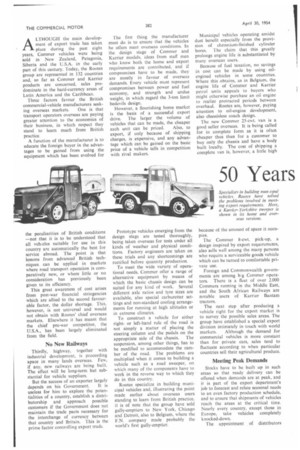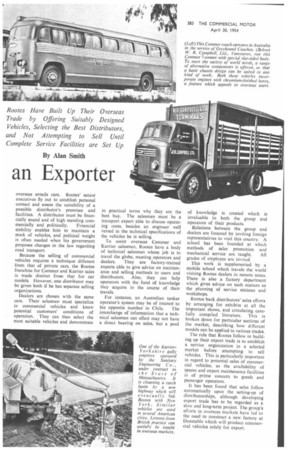50 Years an Exporter
Page 126

Page 127

If you've noticed an error in this article please click here to report it so we can fix it.
the peculiarities of British conditions —not that it is to be understood that all vehicles suitable for use in this country are automatically the best for service abroad. The point is that lessons from advanced British techniques. can be applied in markets where road transport operation is comparatively new, or where little or no consideration has previously been given to its efficiency.
This great awareness of cost arises from post-war financial stringencies which are allied to the second favourable factor, the dollar shortage. This, however, is not universal and would not obtain with Rootes' chief overseas markets. Elsewhere it has meant that the chief pre-war competitor, the U.S.A., has been largely eliminated from the field.
No New Railways
Thirdly, highway, together with industrial development, is proceeding apace in many lands overseas. Few, if any, new railways are being built. The effect will be long-term but substantial for vehicle suppliers.
But the success of an exporter largely
depends on his Government. It is useless for him to explore the potentialities of a country, establish a distributorship and approach possible customers if the Government does not maintain the trade pacts necessary for the interchange of currency between that country and Britain. This is the prime factor controlling export trade. Prototype vehicles emerging from the design stage are tested thoroughly, being taken overseas for tests under all kinds of weather and physical conditions. Factory engineers are taken on these trials and any shortcomings are rectified before quantity production.
To meet the wide variety of operational needs, Commer offer a range of alternative equipment by means of which the basic chassis design can be suited for any kind of work. Several different axle ratios and tyre sizes are available, also special carburetter settings and non-standard cooling arrangements for running at high altitudes or in extreme climates.
To construct a vehicle for either rightor left-hand rule of the road is not simply a matter of placing the steering column and the pedals on the appropriate side of the chassis. The suspension, among other things, has to be modified to accommodate the camber of the road. The problems are multiplied when it comes to building a vehicle such as a road sweeper, on which many of the components have to work in the reverse way to which they do in this country.
Rootes specialize in building municipal vehicles and, illustrating the point made earlier about overseas users standing to learn from British practice, it is of note that the group have sold gully-emptiers to New York, Chicago and Detroit, also to Belgium, where the F.N. company made probably the world's first gully-emptier. because of the amount of space it occupies.
The Commer 8-cwt. pick-up, a design inspired by export requirements, also sells well among the many persons who require a serviceable goods vehicle which can he turned to comfortable private use.
Foreign and Commonwealth governments are among big Commer operators. There is a fleet of over 2.000 Commers running in the Middle East, and the South African Railways are notable users of Karrier Bantam tractors.
The next step after producing a vehicle right for the export market is to survey the possible sales areas. The group have established a special export division intimately in touch with world markets. Although the demand for commercial vehicles is more constant than for private cars, sales tend to fluctuate according to when particular countries sell their agricultural produce.
Meeting Peak Demands
Stocks have to be built up in such areas so that ready delivery can be offered when demands are at peak, and it is part of the export department's job to forecast and relate seasonal needs to an even factory production schedule, and to ensure that shipments of vehicles reach the areas at the critical time. Nearly every country, except those in Europe, take vehicles completely knocked-down.
The appointment of distributors overseas entails care. Rootes' senior executives fly out to establish personal contact and assess the suitability of a possible distributor's premises and facilities. A distributor must be financially sound and of high standing com
mercially and politically. Financial stability enables him to maintain a stock of vehicles, and political weight is often needed when his government proposes changes in the law regarding road transport.
Because the selling of commercial vehicles requires a technique different from that of private cars, the Rotates franchise for Commer and Karrier sales is made distinct from that for car models. However, one distributor may be given both if he has separate selling organizations.
Dealers are chosen with the same care. Their salesmen must specialize in commercial vehicles and know potential customers' conditions of operation. They can then select the most suitable vehicles and demonstrate in practical terms why they are the best buy. The salesman must be a transport expert able to discuss operating costs, besides an engineer well versed in the technical specifications of the vehicles he is selling.
To assist overseas Commer and Karrier salesmen, Rootes have a body of technical salesmen whose job is to travel the globe, meeting operators and dealers. They are factory-trained experts able to give advice on maintenance and selling methods to users and distributors. Also, they can help operators with the fund of knowledge they acquire in the course of their travels.
For instance, an Australian tanker operator's system may be of interest to his opposite number in Chile. The interchange of information that a technical salesman can effect may not have a direct bearing on sales, but a pool of knowledge is created which is invaluable to both the group and operators of their products.
Relations between the group and dealers are fostered by inviting foreign representatives to visit this country. A school has been founded at which methods of sales promotion and mechanical service are taught. All grades of employee are invited.
This work is supplemented by a mobile school which travels the world visiting Rootes dealers in remote areas. There is also a factory department which gives advice on such matters as the planning of service stations and workshops.
Rootes back distributors' sales efforts by arranging for exhibits at all the important shows, and circulating carefully compiled literature. This is broken down for particular sections of the market, describing how different models can be applied to various trades.
The rule that Rootes follow in building up their export trade is to establish a service organization in a selected market before attempting to sell vehicles. This is particularly important in regard to potential sales of commercial vehicles, as the availability of spares and expert maintenance facilities is of prime concern to goods and passenger operators.
It has been found that sales follow automatically upon the setting-up of distributorships, although developing export trade has to be regarded as a slow and long-term project. The group's efforts in overseas markets have led to the need to construct a new factory at Dunstable which will produce commercial vehicles solely for export.




















































































































































































































































